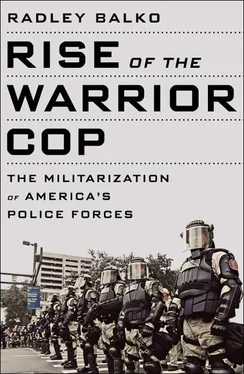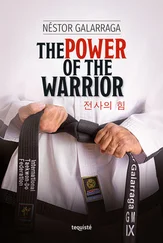The officials in Prince George’s County, two of them elected, openly and without reservation stated that they had no problem with the collateral damage done to the Calvo family. It was part of the war against getting high—which even they had to know is a war that can’t be won. They didn’t even really think it was something to regret or learn from, or to try to avoid in the future. As Calvo himself pointed out on several occasions, this isn’t a problem that can be laid at the feet of the police officers who raided his home. This problem can’t be fixed by firing the police involved. This is a political problem. It’s a policy problem.
Calvo understood all of this almost immediately. Someone sent him a copy of Overkill: The Rise of Paramilitary Police Raids in America , the paper on police militarization I had written for the Cato Institute two years earlier. A policy wonk at heart, Calvo devoured the paper, reading it on his subway rides to and from work. Still traumatized from the raid, his wife didn’t like the image on the cover—a close-up of a SWAT officer with his hand on a machine gun. Calvo then began reading up on the case law behind these raids. Within a few weeks, the charismatic, accessible small-town mayor had become a compelling advocate for reform. I moderated a forum about the raid at the Cato Institute in September 2008. As Calvo spoke about what he had gone through—and particularly about his dogs, and how angry he was that the police tried to blame the dogs for their own deaths—about a fourth of the audience was in tears. He told his story on CNN, the morning network talk shows, and the BBC. And to his credit, he recognized that what had specifically happened to him was part of a broader problem of policy, not of individual cops.
“The reality is that this happens all the time in this country, and disproportionately in Prince George’s County,” Calvo told CNN. “Most of the people to whom it happens don’t have the community support and the platform to speak out. So I appreciate you paying attention to our condition, but I hope you’ll also give attention to those who may not have the same platform and voice that we have.” 12
As Calvo continued to advocate for reform, he started to hear from other victims of mistaken police raids, both in Prince George’s County and around the state of Maryland. Several included the routine, sometimes callous killing of the family dog. Within a week of the raid, for example, Prince George’s County residents Frank and Pam Myers came forward to say that they too were raided by sheriff’s department deputies. Indeed, that raid the previous November had been covered by some local media. When the couple told the deputies that the address on the warrant was two doors down, the police refused to leave. They continued to look around the couple’s house for another forty-five minutes. Then two shots rang out from the backyard. A deputy had gone into the backyard and shot the couple’s five-year-old boxer, Pearl. He claimed that he feared for his life. Pam Myers told a local news station, “I said, ‘You just shot my dog.’ I just wanted to go out and hold her a bit. They wouldn’t even let me go out.” 13
Amber James, another Prince George’s County resident, also came forward. Police raided her home in May 2007 looking for her sister, who didn’t live in the house. According to James, when their search came up empty, they promised to return the next day—and to kill James’s dog when they did. 14
A series of police raid horror stories from Howard County, Maryland, also emerged. Kevin and Lisa Henderson said they were the victims of a mistaken raid in January 2008. At 10:00 PM the night of January 18, a raid team opened the family’s unlocked front door. Inside were the couple, a twenty-eight-year-old houseguest, their two teenage sons, and their sons’ friend. The police first met the family dog, a twelve-year-old lab/rottweiler mix named Grunt. According to the lawsuit, one officer distracted the dog while another shot it point-blank in the head. When one of the couple’s sons asked why they had shot the dog, one officer pointed his gun at the boy’s head and said, “I’ll blow your fucking head off if you keep talking.” The police found marijuana in a jacket pocket of the Hendersons’ house guest. He was arrested. Four days later, after Lisa Henderson called to complain about the raid, she and her husband were also arrested for possession of marijuana, even though the police hadn’t found any drug anywhere else in the house. Ten months later, a state judge acquitted the couple of all charges. The Hendersons believe that the police intended to raid a different house in the neighborhood that looked a lot like their own. A subsequent raid on that house turned up marijuana, scales, and cash. 15
Karen Thomas, also a resident of Howard County, told a Maryland State Senate hearing in 2009 that police shot and killed her dog during a mistaken raid on her home in January 2007. Even after they had surrounded her in her bedroom, she said they still hadn’t yet identified themselves, and she thought the gunshot had been directed at her son. “In my mind, terrorists had just killed my son, and they were going to kill me next.” Boyd Petit told the same committee, “Our collective lives flashed before our eyes” during a mistaken raid on him and his family in April 2008. 16Mike Hasenei, his wife, and their twelve-year-old daughter were subjected to a nighttime raid when police received a tip that Hasenei’s stepson and a friend might have stolen items from a police car, including a rifle and ammunition. They also raided the home where the stepson actually lived, as well as the friend’s home. They found none of the stolen items and made no arrests. Hasenei and his wife Phyllis told the Baltimore Sun that they were still reeling from the trauma. “They had their guns drawn, Angel and I were screaming,” Phyllis Hasenei said. “They had their black-on-black uniforms. All you could see were their eyeballs.” Hasenei added that had police done a bit more investigating, “they would have found out that neither of us are violent criminals, we don’t have criminals records at all.” 17
Armed with these incidents, Calvo went to the Maryland legislature to push for reform. The bill he proposed was modest. It required every police agency in Maryland with a SWAT team to issue a quarterly report—later amended to twice yearly—on how many times the team was deployed, for what purpose, and whether any shots were fired during the raid. It was a simple transparency bill. It put no limits or restrictions on how often or under what circumstances SWAT teams could be used.
Yet it was the only bill of its kind in the country. And it was opposed by every police organization in the state. One Maryland lawmaker attempted to amend the bill to prohibit the use of SWAT teams in cases involving known misdemeanors, a seemingly reasonable restriction. That measure was rejected after more lobbying from police groups.
But the main bill passed the Maryland house in March 2009 by a vote of 126–9, and the state’s senate in April by a vote of 46–0. It was signed into law by Gov. Martin O’Malley. Calvo sent the media a response to the legislation.
Although the botched raid of my home and killing of our dogs, Payton and Chase, have received considerable attention in the media, it is important to underscore that this bill is about much more than an isolated, high-profile mistake. It is about a growing and troubling trend where law enforcement agencies are using SWAT teams to perform ordinary police work. Prince George’s County police acknowledges deploying SWAT teams between 400 and 700 a year—that’s twice a day—and other counties in the state have said that they also deploy their special tactical units hundreds of times a year. The hearings on these bills have brought to light numerous botched and ill-advised raids in Anne Arundel, Baltimore, Carroll, Howard, Montgomery, and Prince George’s counties that also have had devastating effects on the lives of innocent people and undermined faith in law enforcement….
Читать дальше












